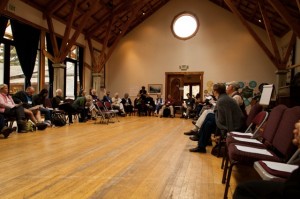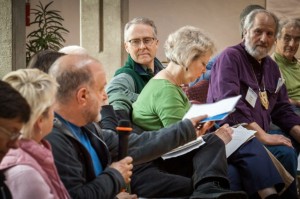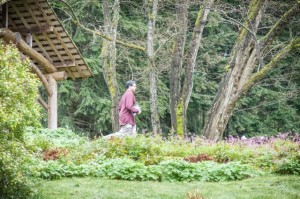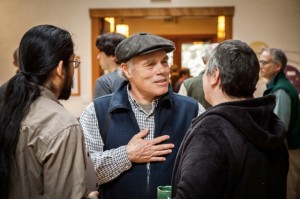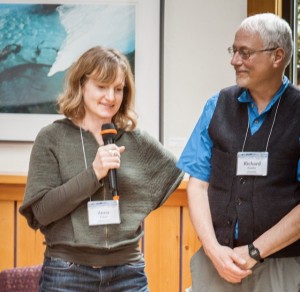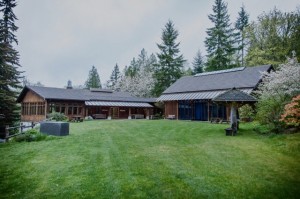 Last Friday, April 19th, a remarkable conference of over fifty climate activists gathered at the Whidbey Institute from around the Puget Sound region. The theme was "Calling the Choir To Sing", based on our growing sense that the "climate choir" needs to unleash new songs, new voices, new and more powerful harmonies - more profound collaborations, to meet the scale of the challenge we face.
Last Friday, April 19th, a remarkable conference of over fifty climate activists gathered at the Whidbey Institute from around the Puget Sound region. The theme was "Calling the Choir To Sing", based on our growing sense that the "climate choir" needs to unleash new songs, new voices, new and more powerful harmonies - more profound collaborations, to meet the scale of the challenge we face.
The idea for this conference grew out of a conversation last fall between Larry Daloz and myself. Larry had just returned from a scorching summer in Vermont with his grandchildren, where the record heats had cooked off his remaining denial about the urgency of this crisis. I had also been thinking about what to do next, in the wake of my book The Circumference of Home. I was feeling the need to enter a more resolute and collaborative phase of my own climate work.
We soon recruited three colleagues to help us design and facilitate the event - Heather Johnson from the Whidbey Institute, Kate Davies from Antioch University's Center for Creative Change, and Derek Hoshiko from YES! Magazine. Climate Solutions, Sightline Institute, YES! Magazine and the Center for Creative Change joined the Whidbey Institute as co-sponsors of the event. KC Golden, Policy Director of Climate Solutions, agreed to be our keynote speaker, and we were off.
Our invitation to regional climate leaders emphasized these questions for discussion:
-
How can we widen the scope of our collaborations to include arenas beyond those we have touched?
- How can we deepen our understanding of the institutional and social factors which thwart effective action, internally and externally.
- How can we gain insight and courage to work more skillfully with the strong emotions evoked by our climate crisis, including denial, despair, anger, judgmentalism and overwhelm?
-
How can we highlight the ethical and moral dimensions of the climate crisis, beyond our usual focus on the scientific and technical aspects of the challenge?
KC Golden's "State of the Movement" talk struck just the right tone for getting us started. He pointed to important shifts he sees happening in the climate movement this year. It isn't abstract or distant anymore, and it isn't just local. The growing immediacy and intensity of our climate crisis has blown us outside the box of the environmental movement and of conventional politics. We have realized that we cannot win this fight if we don't have the fight, and we are starting to really show up.
KC spoke to our need to "approach our activism not just as political strategists, not just as tacticians, but as whole people, and to think about what it means to do right on climate from the perspective of our place and who we are and how we walk in the world. A lot of our time is taken up with relatively short-term tactical and strategy maneuvers, and the opportunity to spend a whole day together, learning from people who are struggling with a lot of the same things, and reaching down a little deeper and see what's really moving us - where we're scared, where we're challenged, where we see hope and opportunity - that's just a rare and precious thing to be able to do."
He goes on to say, "I think we're undergoing a transition now, to a place that is more firmly grounded in what it means to approach the climate challenge as human beings who live and work and occupy a place. I think people are taking it deeper - partly out of fear, partly out of hope - but completely out of a sense that we need to get around to approaching this challenge from a deeper, more powerful place as human beings, if we're going to generate the kind of personal power, and attract the kind of political power, that we need. And I hear that in people's voices in a new way now."
In the coming weeks I will share more ideas from talks given at this wonderful gathering. Anna Fahey of Sightline spoke about "Tapping Into Dark Optimism". Joe Brewer of the Climate Memes Project spoke about "Why Global Warming is a Bad Meme (and What We Can Do About It)". Julie Trimingham of Coal Facts spoke about "Local Organizing for Action". And Richard Conlin of the Seattle City Council spoke about "The Role of Food in Climate Change". Stay tuned.


